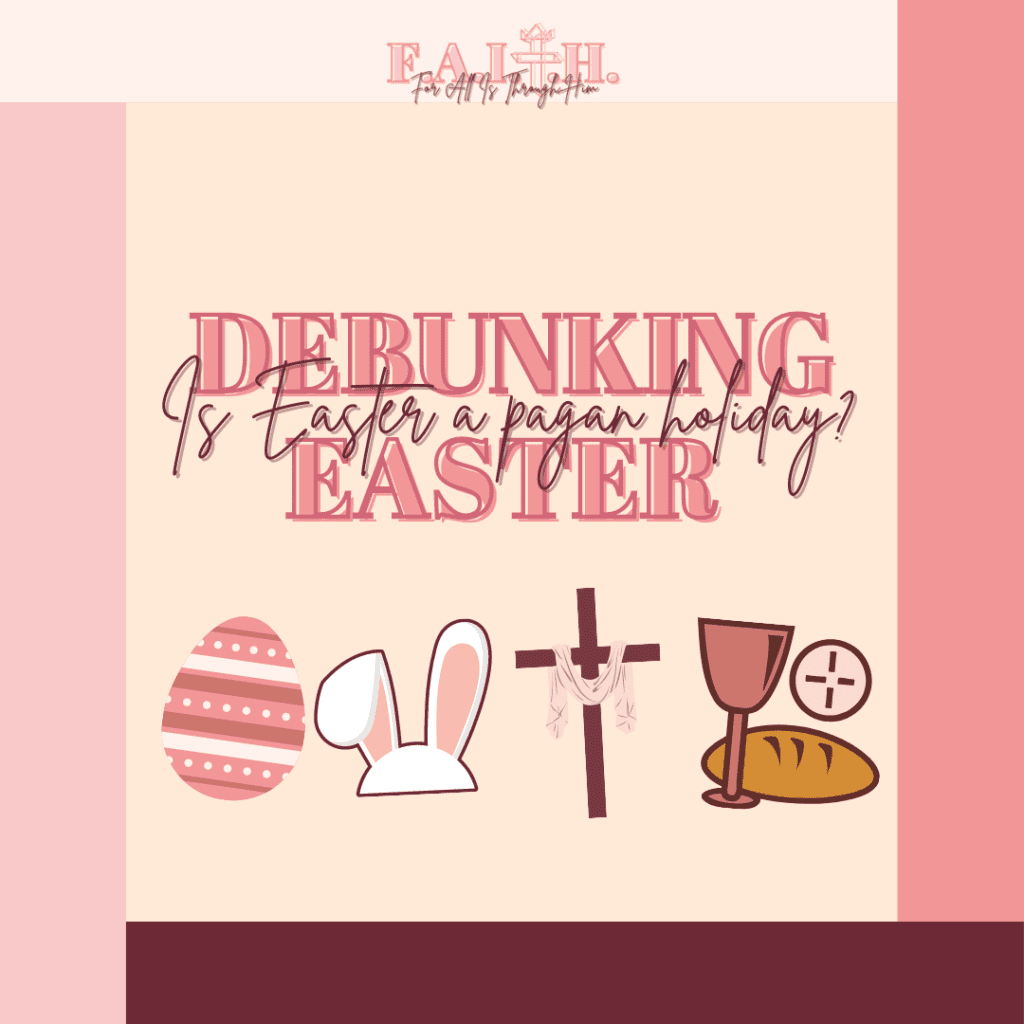In today’s Study Sunday blog post we will be giving you a theological study debunking the 3 most popular myths about Easter, which surrounds the idea ‘is Easter a pagan holiday?’. You can follow along through the audio study guide or the written study itself.
Let’s start debunking!
MYTH #1 – Easter is a Catholic holiday, and the church should only celebrate Passover.
The Truth #1
The name “Passover” comes from the Hebrew word “Pascha”.
This meal that was shared with Jesus and His disciples just before His betrayal was the Passover Jesus would have been celebrating as a Jewish man.
Most early Christians were Jewish, therefore, they naturally continued to celebrate Passover but tended to integrate the celebration of Jesus’ resurrection into the holiday; this is much of what we see Messianic Jews will do today.
However, a controversy arose in the 1st century, this was in the first 100-300 years after Jesus’ ascension into heaven. As many Gentiles began to join the church, there became a divide between those who celebrated a Messianic Passover with the Jewish traditions and those who observed the resurrection without the Jewish traditions.
The Passover Jewish tradition consisted of a 3 day fast before the Passover meal, a vigil a night before the celebration, and a feast. These traditions actually carried over to the observation of Jesus’ resurrection, which the Christians celebrated as we now know as the Easter holiday.
The controversy didn’t stop there. 200 years after the 1st century there was division in the idea of Easter itself. This controversy was called the “Quartodeciman controversy”; it had to do with the date Easter was celebrated.
Christians at that time were celebrating Easter according to the Jewish Passover date, the 14th of Nisan (which is the month of April in the Jewish calendar).
However, other Christians were celebrating Easter a week later.
It was decided by the Nicaea council that the Easter date would be determined by the first Sunday after the Pascha full moon, after the spring Equinox.
The Easter celebration changed over the years and it developed into a 50-day event, which had a longer fasting period to commemorate Jesus’ time in the wilderness and to mourn his crucifixion.
This eventually became Lent which developed into a holiday in the Middle Ages, where the emphasis was no longer on His resurrection but more so on His death and the morning surrounding that period.
Lent is a Catholic practice where they would use Easter as a method to evangelise and disciple new converts by training them with Christian teachings and doctrines leading up to their baptism on Resurrection Sunday.
So, Easter was hugely recognised for baptisms.
Time continued on and the Catholic church added “Mardi Gras” which is French for “Fat Tuesday”. This is when you would use up all the meat and dairy products before fasting during Lent. Then “Ash Wednesday” would launch you into Lent where you would fast.
The Reformers, however, removed these two days of celebrating Easter and kept the Holy Week days which were “Mardi Thursday” which was when Jesus started His walk to the crucifixion, “Good Friday” which was when Jesus was crucified, “Holy Saturday” and “Resurrection Sunday” when Jesus resurrected.
As we can see, while some Christians do celebrate Passover, Easter/Pascha is a distinctly Christian holiday and has been since the 1st century.
This is why it is important that we know our Christian history because it explains a lot of what we know and do today, and it connects to the theology that makes up our Christian faith.
Many of us, particularly those of us who grew up in a non-liturgical or non-Catholic church may have not been aware of the rich legacy that we have as Christians when it comes to celebrating Easter.
MYTH #2 – Easter eggs and bunnies are taken from pagan fertility festivals.
The Truth #2
Where did the easter eggs come from? Well, Lent had a lot to do with that.
In the Mediaeval times, Lent and fast were very strict. You would abstain from all meat and dairy products including eggs, but eggs would be boiled to preserve them longer, and you would eat the eggs to break your fast.
Painting eggs came later on as a way to celebrate Easter, you would see this in Ukraine. Easter eggs are a symbol of new life to represent the resurrection; being born again out of the old and coming into the new, breaking free from the shell.
Okay, but where did the easter bunnies come from?
Well, very early on the Virgin Mary was associated with the hare, which was often mistaken for a rabbit. You can see this in early Christian paintings by the artist Titian, whenever there was a painting of Mary, he would paint a white rabbit beside her.
This was because of the association between the rabbit’s fertility and purity and Mary’s.
Rabbits are used in pagan holidays and other religions as a symbol of fertility. The same as the celebration of Esotre in an Anglo-Saxon culture which we will get into shortly. Therefore, it should not come as a surprise when Christian symbolism is copied or twisted in other traditions.
Also, since rabbits were an additional symbol to Easter’s meaning and not a core value, their presence surrounding Easter does not make the holiday pagan. It just means that Christians took rabbits to reflect a certain principle that is inherent to Easter, just like pagans took them to represent their own principle.
The commercialised Easter bunny that we know today was from Jacob Grimm and traditions from German immigrants.
The idea that the Easter bunny was distinctly pagan, was popularised in the 18th century by Jacob Grimm.
There is actually no hard evidence of the statement that he made, other than just his own speculation.
To summarise, eggs symbolise resurrection and were fasted during Lent. White rabbits are affiliated with Virgin Mary.
MYTH #3 – Easter is a pagan holiday named after the goddess Eostre.
The Truth #3
Is Easter a pagan holiday?
Well, some people believe that Easter is a pagan holiday named after the goddess Eostre.
But that is not true, as we have learnt so far, Easter has all along been a holiday that is rooted in Christian traditions, scripture, and the stories of the gospel and connected to Passover in many ways.
So where does this accusation come from?
Well, it has to do with the word “Easter” itself, because the word “Easter” is connected to the name “Eostre” a goddess in Anglo-Saxon pantheons.
The first mention of this was by the Venerable Bede who was a Monk in De Temporum Ratione; an Anglo-Saxon era (AD 725); mentioning that the indigenous English name of the month “Eostur-monath” is now translated as “Paschal month” and was named after the goddess Eostre.
Therefore, people have concluded that because Easter as a holiday was associated with the month that is in Esotre’s name, this means that Easter is a pagan holiday, it is not Christian and it should not be celebrated.
However, the only places where Easter has its name rooted in the goddess Eostre are countries that have been affected by that Anglo-Saxon pantheon such as Britain and Germany. But if you were to go anywhere else in the world, particularly countries in Europe, the name Easter as a holiday goes back to the original word which is “Pascha” taken from Hebrew.
To further clarify this accusation, the spring Equinox was called by the goddess’ name in the Anglo-Saxon culture. When Anglo-Saxons were exposed to Christianity and learnt about Easter, and when it was celebrated, they simply denoted the Pascha celebration by the spring Equinox’s name, which was Easter. This does not mean that the holiday itself is pagan.
This should tell you that there is no ground for this accusation, if anything it shows us that Easter as a holiday is solely and firmly connected to Passover, which is biblical, and therefore Christians should celebrate it.
Easter is not a pagan holiday! It is a holiday rooted in biblical truth about the resurrection of Jesus, right at the Jewish Passover.
I hope this theological breakdown of Easter helped to put the myths into perspective by sharing the light of God’s truth in them.
Have a blessed Easter celebration!
Stay blessed,
Divine L.
Resources
The Holy Bible – https://my.bible.com/en-GB
Verity by Phylicia Masonheimer – “Is Easter Pagan” (Podcast) – https://open.spotify.com/episode/6FXEqcWm3r92Rk43MWLr4i?si=e583033faa9b4864
Got Questions – “What are the origins of Easter?” (Website) – https://www.gotquestions.org/easter-origins.html
Got Questions – “Is Easter a pagan holiday?” (Website) – https://www.gotquestions.org/Easter-pagan-holiday.html
Got Questions – “What is the origin of the Easter bunny and eggs?” (Website) – https://www.gotquestions.org/easter-bunny-eggs.html

Hi, I am Divine L., your sister-in-F.A.I.T.H., who is passionate about discipling Christian girls to be a walking embodiment of Jesus Christ in their daily lives and to help young girls and woman become who God destined for them to become. It is a great blessing to welcome you to the F.A.I.T.H. sisterhood!

